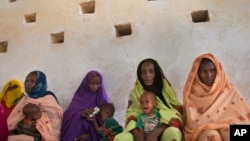Improving access to education, healthcare and jobs for women in the arid Sahel region of Africa could play an important part in rolling back poverty in one of the world's most underdeveloped areas, the U.N. special envoy to the region said.
Hiroute Guebre Sallassie, the U.N. secretary general's special envoy to the Sahel, said the traditional role of women - including low levels of education and participation in the formal economy - was an obstacle to development.
"Without a fundamental restructuring of the role of women, the Sahel risks delaying its legitimate aspirations...in terms of development," Sallassie told a news conference late on Monday.
UN Women, a United Nations agency focused on gender equality, has suggested that the impoverished countries of the Sahel are amongst the worst performers in the emancipation and equal rights of women.
In Burkina Faso, Chad, Mali, Niger and Senegal more than 90 percent of women had no formal education, it said in a report whose regional findings Sallassie presented in the Senegalese capital Dakar. The report was first released in April.
While globally women are in school for an average of 7.3 years, compared to 8.2 years for men, women in Sahel countries received fewer than three years of formal education on average.
In Burkina Faso, that fell to just 0.3 years.
Men in the Sahel region are also educated less than the global norm, enrolling in school for an average of fewer than five years. Still, men's average school attendance was up to three times as long as their female counterparts, depending on the country.
The report called for a virtuous circle of decent jobs, social services and government policy prioritising education and equality.
Lack of economic independence had repercussions on women's rights. Some 69 percent of women in Senegal said, for example, they do not have the final say over their own healthcare.
Female genital mutilation remains common in many countries in the mostly Muslim region.
Nicole Gakou, the president of the union of female business leaders in Senegal, said that large-scale financing needed to be made available to female entrepreneurs to allow them to undertake bolder projects.
"Women today are confined to everything that is 'micro': micro-credit, micro-businesses," she said. "We need other things ... substantial financing. Funding for long-term projects."











